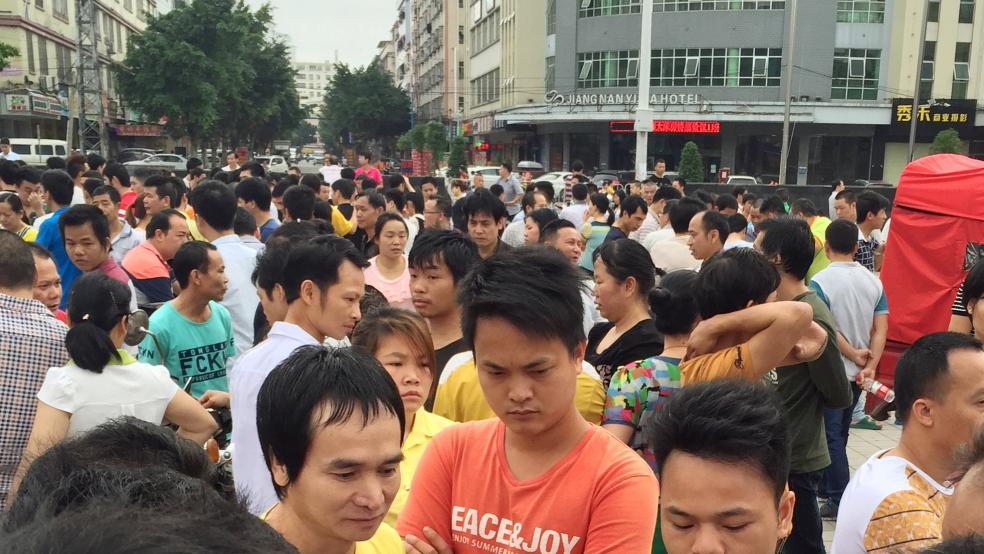SHANGHAI (Reuters) - China's flagging economy is making it harder for Beijing to mend holes in its pension system for 166 million of the country's migrant workers, a problem that contributed to a doubling in the number of strikes last year.
Once a driver of economic growth, China's army of migrant workers is aging. More than 40 percent of migrants today are over 40 years old, compared to 30 percent in 2008, government data show, yet less than a sixth of them have a pension.Forcing manufacturers to start contributing more to their workers' retirement funds now will be tough though, given that slowing growth and rising costs are already causing factory closures and layoffs.But doing nothing risks inciting more labor unrest, a central concern of Chinese leaders. The number of strikes in 2014 rose to 1,378 compared to 656 the year before, according to Hong Kong advocacy group China Labor Bulletin. Some of that growth was due to migrant workers protesting over their pension arrangements, an issue that rarely caused strikes until last year. "The government and factory have a responsibility to look after us," says Peng Xiaomei, 50, who has worked for 22 years in a bag factory in Shenzhen, near Hong Kong, but is not yet eligible for a pension. Last April, nearly 40,000 employees of Nike and Adidas supplier Yue Yuen took to the streets in the southern province of Guangdong, demanding the company make full pension contributions. Beijing - and local governments - are partly to blame for the pension shortfall. Factory auditors say officials in export regions rarely demanded full social insurance contributions from companies as they want to keep them investing in their province. During the 2008 financial crisis, the central government made this official, allowing struggling companies to delay social insurance contributions for their staff for "no longer than six months," according to a document dated December 22, 2008 posted on the Ministry of Human Resources and Social Security's website. That policy was formalized in 2011 when China's social insurance law came into effect and allowed companies to delay paying their contributions if they had permission from the local authorities. Provincial government websites in Guangdong, Guangxi, Shanxi and Sichuan all indicate companies are allowed to postpone social insurance payments.INVESTMENT COMPETITIONEmployers in China are required to pay into the national pension plan on behalf of their staff - typically around 20 percent of an employee's wage - and employees chip in another 8-10 percent. Employees must contribute for 15 years to become eligible for benefits. The statutory retirement age for corporate employees in China is 50 for women and 60 for men. Chris King Chi Chan, associate professor of sociology at the City University of Hong Kong who researches labor and civil society in China, says the government's efforts to lighten the burden on companies is due to the intense competition among regions to attract investment. "Local governments and foreign investors share a common interest. This kind of collusion between government officials and companies is particularly prevalent in areas like Guangdong," he says. Workers have not made the complicity of government a focus of their protests. But coverage in state media of the social insurance law has educated workers. Lawyers and labor activists say the slowing economy has coincided with the first generation of migrant workers hitting retirement age. Now many of these workers are discovering that despite decades of work, their pensions are meager and opportunities for re-employment scarce. The system is "very unfair to the first generation of migrant workers," says Shenzhen worker Peng, whose employer only started making contributions to her pension 13 years ago, meaning she will have to top it up by about 1100 yuan ($176) a month for around two years.China has 268 million migrant workers in total, but the situation is particularly difficult for 166 million of them that work outside their home provinces. Under Chinese law, while migrant workers can transfer their personal pension contributions between provinces, only 12 percent of the larger employer contribution is transferred.Some experts have called for migrants to be able to keep the full employer contribution."Migrant workers contribute too much and get too little," says Duan Yi, a labor lawyer based in Shenzhen with law firm Laowei. Manufacturers aren't happy, either. With labor costs rising at least 25 percent every year, many Hong Kong manufacturers in Guangdong have fallen on hard times, says Stanley Lau, chairman of the Federation of Hong Kong Industries, a 3,000-member business lobby. A factory laying off workers might be able to negotiate with local officials over the timeline for paying wages and benefits they owe their staff. But once a factory decides to close, officials stop negotiating, Lau says. "You have to pay everything to the workers. Otherwise the government departments, the labor department, the police department will come after you." (Reporting By Alexandra Harney; Additional reporting by Shanghai newsroom; Editing by Rachel Armstrong)China's slowdown spells trouble for migrant workers' pensions

STAFF



